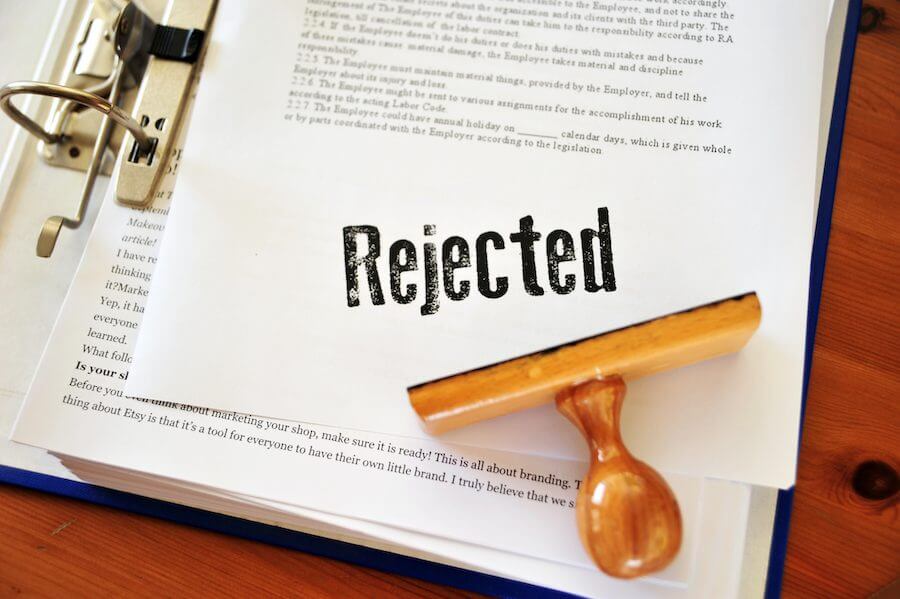Receiving an email about job rejection from a prospective employer can be emotionally challenging to handle, especially if an applicant is sure about their prospects of getting the job. Rather than just deleting the hiring manager’s rejection email and moving on, an applicant should know how to respond to it by sending follow-up emails expressing their gratitude, and requesting consideration for future positions.
Learn more about how to respond to such an email by reviewing this comprehensive article.
Free Templates
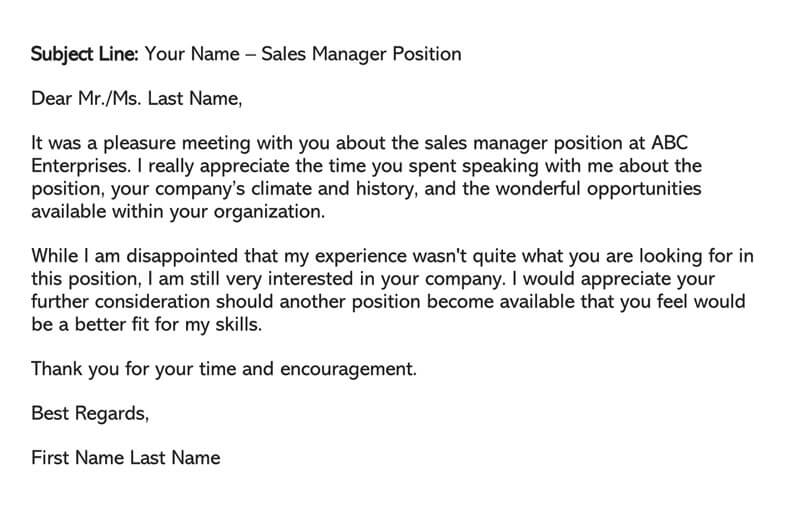
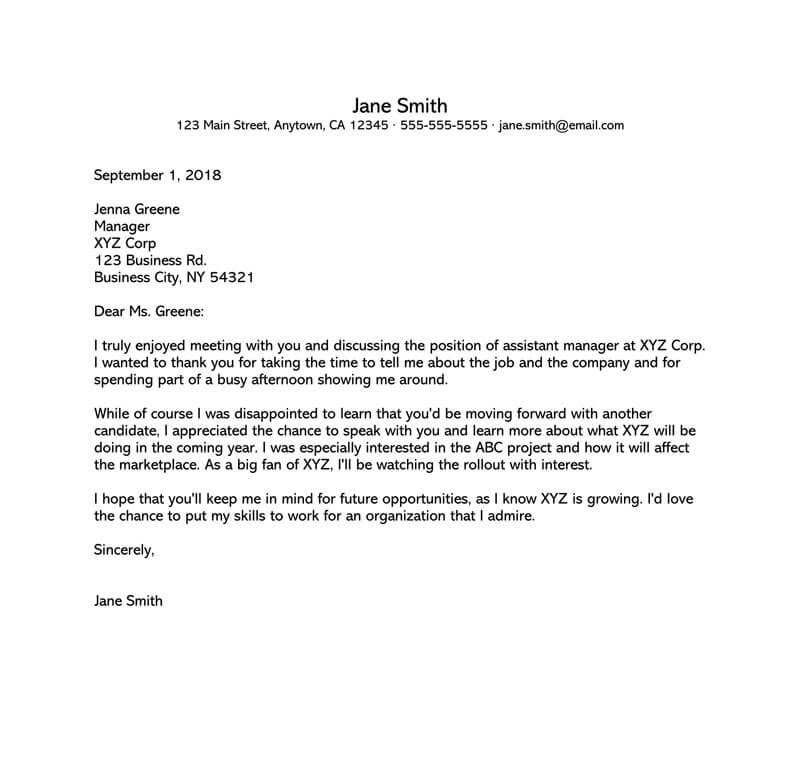
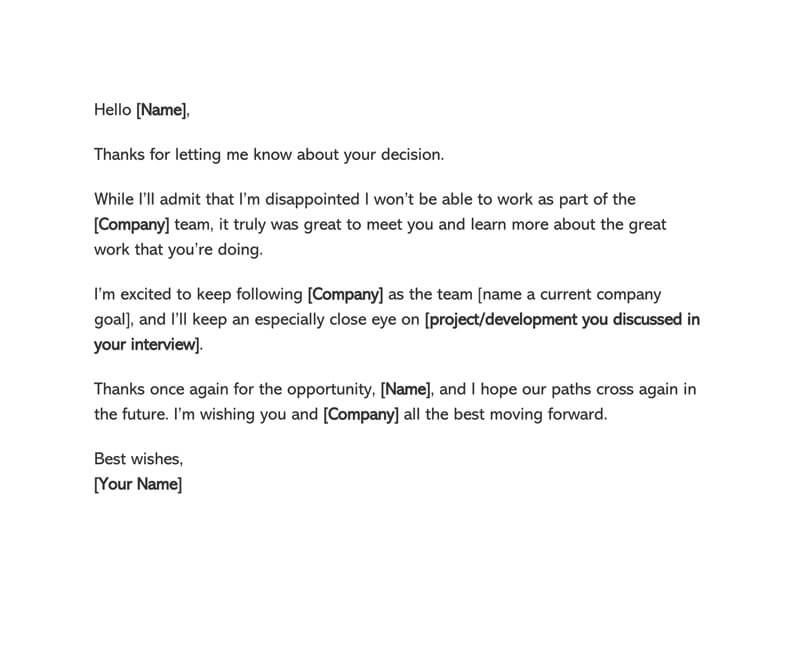
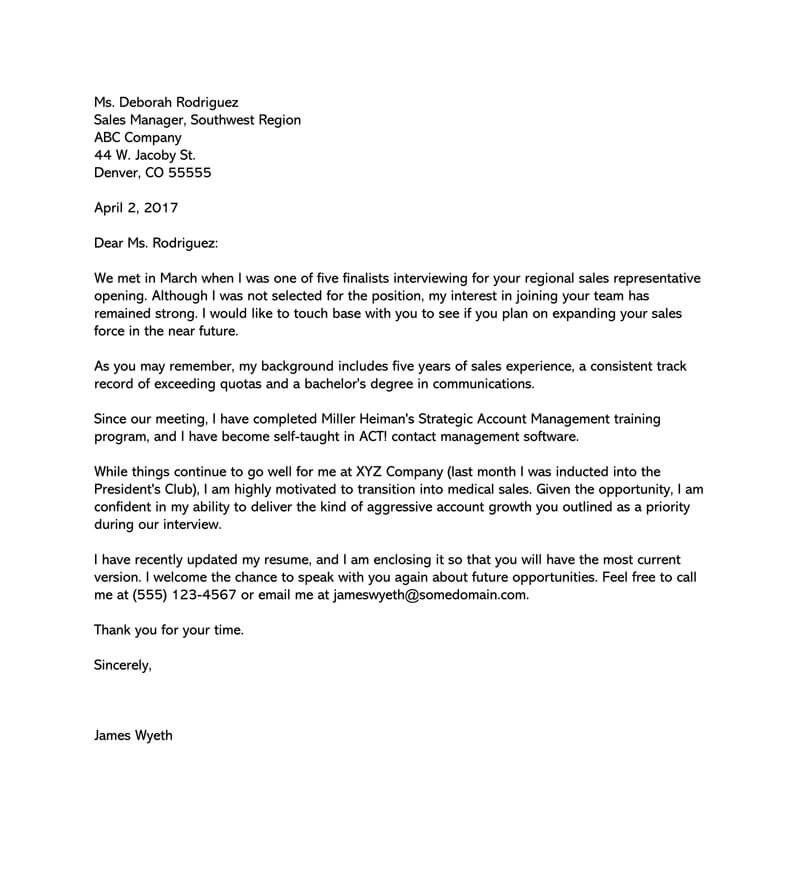
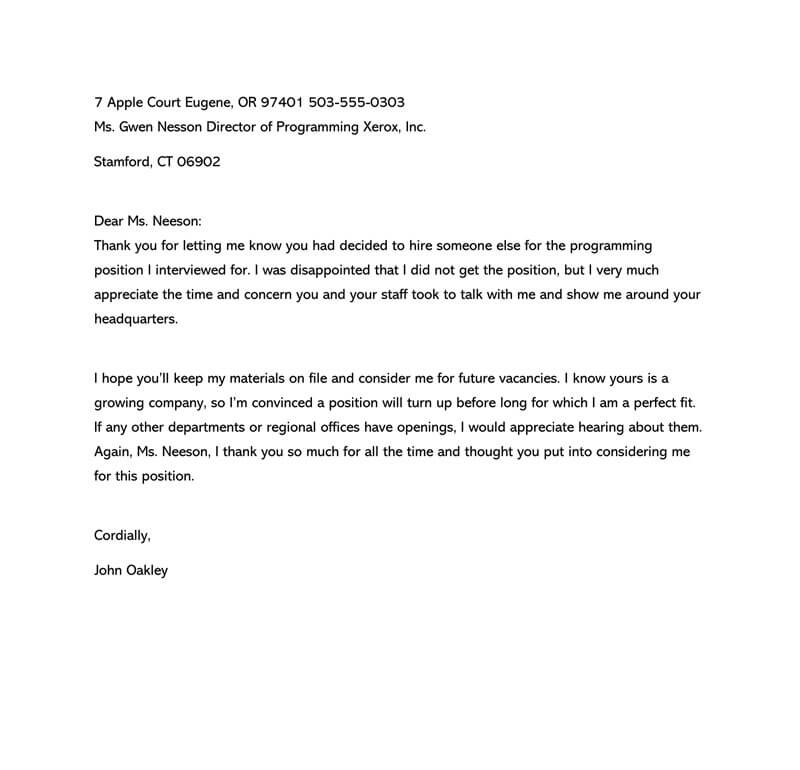
Why Should One Send Follow-Up Email After Job Rejection?
While taking the time to craft follow-up emails after job rejection and sending them to a prospective employer may seem unnecessary during certain times, the act of doing so can be very beneficial to an applicant. It is a great way of demonstrating that the applicant was genuinely interested in the position and is disappointed that it didn’t work in their favor.
Most job seekers simply move on to making their next application for a potential job once they receive the rejection email after the interview. Not many people want to spend time thinking about the missed job opportunity or even trying to analyze why they were rejected.
If you, however, find yourself in this position, you should consider writing a response to the rejection letter due to the following reasons:
It demonstrates professionalism
Writing follow-up emails after a job rejection is an excellent way of demonstrating professionalism and courtesy. Many employers resolve not to hire a candidate and fail to send them this email. If an employer informs an applicant that they did not qualify for the job, they have shown a somewhat rare example of professional courtesy. Even though the employer’s decision doesn’t favor the applicant, reaching out to them to express gratitude for the opportunity demonstrates professionalism. Therefore, maintaining this cordial and respectful demeanor is crucial, as it helps the applicant to foster a strong bond with the hiring manager as it shows the corresponding professionalism of the applicant; which could also help the managers keep the applicant in mind for future positions with the company.
It leads to potential opportunities with the company
One fact that you should keep in mind is that if you had a shot at securing an interview with a certain organization, then the interviewers would be well aware of your qualifications. They may have different reasons for not hiring you, but that does not mean that your qualifications cannot secure you that position in the future.
Writing a polite and thoughtful follow-up email after a job rejection can move the applicant higher up the list of almost-hired candidates. This is a great place for the next job opening or if the new hire decides not to take the job due to reasons such as the job not being a good fit for them or if they find a better offer with another employer. When an employer disqualifies an applicant, it doesn’t mean that they are not suitable prospects. Instead, it means that the candidate was not suitable for the specific role at the time. Responding to this email helps a candidate maintain a good relationship with the employer, and this may encourage them to reach out to the applicant whenever they are hiring for a position that best aligns with the applicant’s qualifications and experience.
It allows one to gain feedback on their interview skills
When crafting follow-up emails after a job rejection, the applicant should request feedback on their interview performance. The employer feedback obtained enables the applicant to learn what they are doing right and what interview techniques they need to master to help them ace future interviews.
It helps applicants expand their network
Job opportunities, even unsuccessful ones, are occasions, where one can expand their network. While the applicant might not have secured the job, they can still use the interview process as an opportunity to build a robust professional network for their career down the line. Responding to such an email and thanking the interviewers for taking the time to get to know the applicant is one way of fostering such networking relationships.
Writing Follow-Up Emails After Job Rejection
Follow-up emails after job rejection do not need to be elaborate. The applicant should simply thank the interviewers for their time, express their disappointment, show their continued interest in the company, and request feedback on their interview performance.
And therefore, when writing it, consider including the following key elements:
Thank the Interviewers
The first paragraph of the follow-up email should be a thank-you note to the interviewers. This is especially where the applicant made it to a second or final interview, meaning that the employer invested much time in considering them for the job.
While writing this section, consider touching on each of the following points:
- First, the applicant can thank the hiring manager for letting them know the outcome of the search, even though they didn’t choose them.
- Secondly, the applicant can write a thank you note to the interviewers for their time, courtesy, and consideration during the interviewing exercise
- Thirdly, the applicant can mention something they learned about the company that especially impressed them or mention a skill they learned from certain people working in the organization
TIP
The thank-you note to interviewers’ section should only be covered in one or two sentences and should be mentioned early in the applicant’s follow-up email.
Appreciating the panel of interviewers and hiring managers may be the key to you getting a job in the future if you happen to meet them. If you warmly express your gratitude for the opportunity, they provided you by letting you participate in the interview process, you will have created a lasting impression.
Mention the job position
Hiring managers are usually busy people. At any given time, they might be busy coordinating with dozens of other candidates to fill other open requisitions assigned to them. For this reason, it is very likely for them to forget to send a specific email for job rejection to a particular applicant. Therefore, the applicant should reference the job position for which they are writing the follow-up emails to help the hiring manager remember the precise position and probably remind them of the exact applicant
Express the dismay
The applicant should briefly state their disappointment in not receiving the role using a few quick sentences. While writing this section, the applicant should try as much as possible to maintain a positive and polite tone throughout. Expressing dismay demonstrates to the hiring manager that the applicant was invested in getting the role and that they enjoyed their time in the company.
NOTE
You are required to express yourself as politely as possible, without showing any hint of negativity.
Writing out your disappointment in the right manner will go a long way in showing that you are quite interested in working for that company.
Request for future opportunities
The fourth element of the follow-up email should be a statement expressing the applicant’s continued interest in the company. This section is essential since it shows the hiring manager that you would like the organization to consider you for future opportunities.
EXAMPLE
The applicant can briefly state that they had a good time learning about the company and would like to be considered for future opportunities. This reminds the hiring managers to keep the applicant’s resume for later and reference it when a position comes along that aligns well with the applicant’s skills, qualifications, and experience.
Ask for feedback
One optional addition to an applicant’s follow-up email is a request for feedback about why the applicant wasn’t selected for the position. While including it, bear in mind that such replies are more acceptable for candidates who are still early on in their careers, such as graduate interns. However, if the hiring manager’s email contains details of why the applicant was disqualified, there is no need to request feedback. The same applies to candidates who have lots of experience in the specific job industry as they can easily know where they went wrong judging from their interview performance
Given that the applicant decides to request comments and feedback from the employer, they should do so respectfully and in a manner that doesn’t come across as questioning the employer’s decision. Besides, the applicant should be mindful that the hiring manager is busy and may have many other candidates to interview. If the applicant asks clearly and politely, they might get some valuable insights into why they weren’t the best candidate for the job and what they can do to improve their interview skills.
Job Rejection Follow-up Email Template
Subject Line: Appreciation for the Opportunity and Request for Feedback – [Your Full Name]
Dear [Hiring Manager’s Name],
I hope this message finds you well. I wanted to express my sincere gratitude for the opportunity to interview for the [Position Name] at [Company Name] and for considering my application among the many qualified candidates.
While I am naturally disappointed not to have been selected for the position, I remain very interested in [Company Name] and its mission to [mention something specific about the company or its mission]. I believe strongly in the work your team is doing and would welcome the opportunity to contribute to your efforts in the future.
If possible, I would greatly appreciate any feedback you could provide regarding my interview performance and application. I am always looking to improve and understand more about how I can align my skills and experiences with the needs of [Company Name]. Any insights you could share would be invaluable as I continue my professional journey.
Additionally, please consider keeping my information on file for any future openings that you believe might match my qualifications. I am very enthusiastic about the possibility of joining your team and contributing to the exciting projects at [Company Name].
Thank you once again for this opportunity and your consideration. I look forward to hopefully working together in the future and wish you and your team the best in your ongoing and upcoming projects.
Warm regards,
[Your Full Name]
[Your LinkedIn Profile] (optional)
[Your Phone Number]
Sample Email Job Rejection Follow-up
Subject Line: Thank You for the Opportunity – Jane Doe
Dear Ms. Thompson,
I hope this email finds you well. I wanted to extend my sincerest thanks for the opportunity to interview for the Content Writer position at Creative Media Solutions. It was a pleasure to learn more about your team’s innovative projects and the impactful work you do in digital content creation.
Although I was not selected for the role, I remain inspired by Creative Media Solutions’ commitment to storytelling and audience engagement. I believe strongly in your mission to deliver compelling and informative content, and I am enthusiastic about the possibility of contributing to such efforts in the future.
If it’s not too much of an imposition, I would greatly appreciate any feedback you could offer regarding my application and interview. I am keen to understand how I can improve and better align my skills with Creative Media Solutions’ needs. Any insights you provide would be invaluable to my professional development.
Please also consider keeping my information on file for any future opportunities that may arise. I am very interested in the possibility of joining your team and contributing my skills in content writing, SEO optimization, and multimedia storytelling to support Creative Media Solutions’ goals.
Thank you once again for considering my application and for the valuable experience of interviewing with your team. I wish Creative Media Solutions continued success in all your projects and hope to have the chance to contribute to your work in the future.
Warm regards,
Jane Doe
jane.doe@email.com
(555) 123-4567
Key Takeaways
This thank-you email after a job interview for a Content Writer position exemplifies several best practices in post-interview communication:
- The writer begins by expressing sincere thanks for the interview opportunity, setting a positive and polite tone for the message. This shows appreciation and professionalism.
- Jane Doe clearly reiterates her interest in the company and the role, despite not being selected. This keeps the door open for future opportunities and underscores her enthusiasm for the company’s mission and work.
- Politely asking for feedback demonstrates a proactive approach to professional development. It shows the sender’s willingness to learn and improve, which is a valuable trait in any candidate.
- By asking to keep her information on file and expressing interest in future roles, Jane Doe smartly navigates the situation to ensure she remains in consideration for other positions that align with her skills.
- The email is professionally written, maintaining a positive tone throughout. There’s an emphasis on future possibilities rather than dwelling on the missed opportunity, which reflects well on Jane Doe’s character and resilience.
- Including her contact details makes it easy for the recipient to reach out in the future, either with feedback or job opportunities, ensuring seamless communication.
Overall, the email is a model of how to gracefully and effectively respond to a job rejection, highlighting gratitude, continuous interest in the organization, and a commitment to professional growth, while keeping the lines of communication open for future possibilities.
Job Rejection Follow-up Email Templates
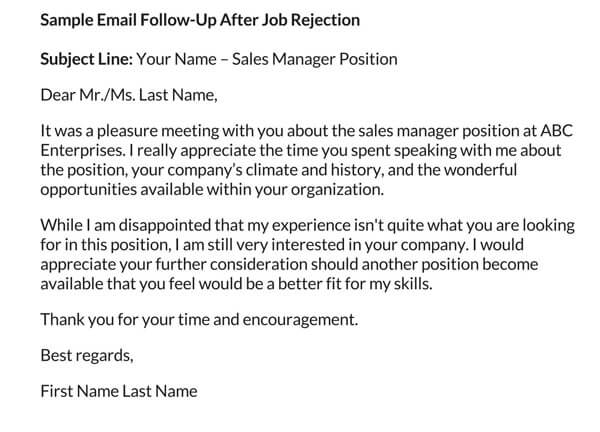
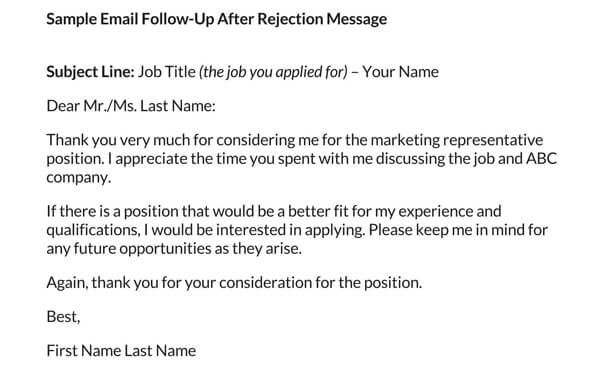
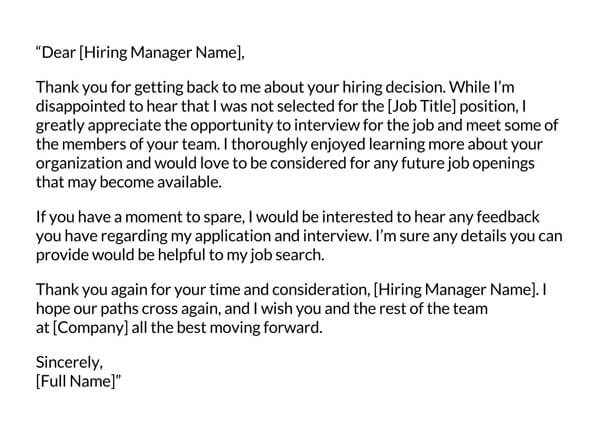
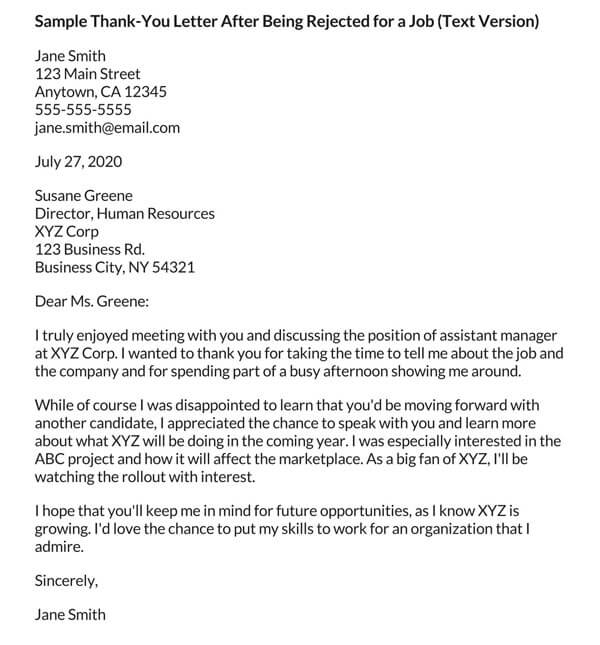
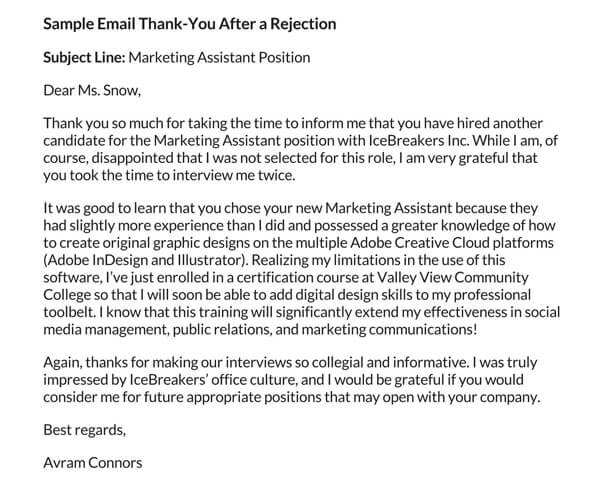
Things to Avoid in the Follow-up email
When writing a follow-up email, there are certain things that the applicant should refrain from asking about or mentioning.
These include:
Asking about what you should have done to be selected for the job
Follow-up emails are not the place to question why an applicant has been turned down for a job or to solicit feedback about what the applicant could have done to be selected for the position. Instead, they present a perfect opportunity for the applicant to thank the recruiters for considering them in the first place and demonstrate the applicant’s genuine interest in working with the company for future positions. Therefore, when writing the email, an applicant should avoid asking such questions.
Asking why the recruiter saw another candidate as the best fit
Most employers are not always willing to discuss the details of their hiring decisions with other candidates, and their decision is final. On the other hand, follow-up emails shouldn’t be an opportunity to deliberate one’s grievances with the recruiter for not seeing how much of an asset the applicant would be compared to the selected new hire. Furthermore, asking why the recruiter chose another candidate may imply that the applicant is questioning the recruiter’s decision-making skills, which may leave a lasting negative impression of the applicant on the employer.
Trying to find out about the selected candidates
While writing follow-up emails, the applicant must refrain from inquiring about the candidate that the employer selected. This does not show professionalism, and it negatively reflects on the applicant. Therefore, while writing the emails, the applicant should keep in mind that the recruiter might have selected someone else for reasons that had nothing to do with their qualifications or personality, such as timing, and hence finding more information about the given person may not be worth it.
You should be well aware of the fact that writing the response or follow-up to the rejection letter or email is not an opportunity for you to express your negative emotions. On the contrary, it is an opportunity for you to show your commitment to professionalism, which is why you should stick to writing a professional response that creates a lasting impression. If you do this, then you may be lucky enough to secure yourself a position with the organization in the future when an opportunity arises.
Conclusion
Responding to an employer’s job rejection letter by writing them a follow-up email is a good way of maintaining a positive relationship with a company. In addition, the follow-up email is a great opportunity for an applicant to show appreciation to an employer for considering them for a job and is a better way of seeking helpful interview feedback from a professional.
By following this article’s guide and writing tips, an applicant should have no trouble writing a professional and gracious follow-up email for this purpose.

